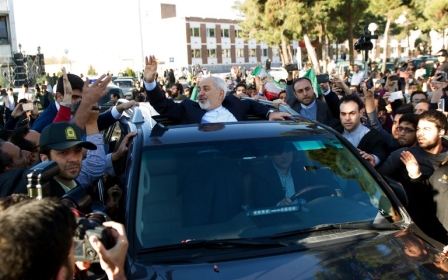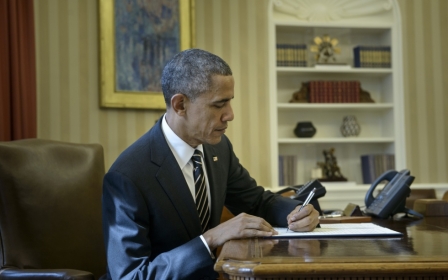Kerry urges patience on Iran amid pressure from US Congress

Secretary of State John Kerry spent a second day Tuesday urging US lawmakers not to interfere in sensitive Iran nuclear talks, hours before senators vote on giving Congress a say on the accord's fate.
As the Obama administration faced scepticism in closed-door meetings with House and Senate members, a compromise emerged on a Senate measure that would shorten the period that Congress would have to review the final deal.
Senate foreign relations committee chairman Bob Corker said the total review period would be reduced to 52 days, from the 60 days in earlier drafts of the bill.
The period includes a 30-day review, plus 12 days for a possible veto by President Barack Obama and a 10-day window for an attempt to override such a veto.
The White House as recently as Monday said Obama would veto the bill in its early form.
"My sense is we're moving towards a strong support in committee," Corker told reporters before senators met behind closed doors with Kerry.
The idea is that the compromise legislation would bring more Democrats on board, potentially building a veto-proof majority.
Senate Democrat Chris Coons said he was encouraged by the shift from a 60-day review to 30 days, "so that there's less of a risk that it will drag on."
But he warned that including poison-pill amendments in the legislation - such as one being considered that would require Iran to recognise the state of Israel - would lose his support.
"What this bill provides is a congressionally enacted, focused and concise framework for the exchange of information and the review by Congress where, at the end of the day, if a veto by the president of a resolution of disapproval is not overridden, the agreement proceeds," Coons said.
The framework, reached in Lausanne, Switzerland, marked a major breakthrough in a 12-year standoff between Iran and the West, which disputes Tehran's denial that it is seeking to acquire nuclear bomb.
Global powers must resolve a series of difficult technical issues by a 30 June deadline for a final deal, including the steps for lifting global sanctions imposed on Iran, and remaining questions over the possible military dimensions of its nuclear programme.
While some Democrats pressed Kerry on why lawmakers should let the White House move ahead with the Iran accord without their involvement, the top US diplomat provided a reasoned, comprehensive argument for doing so, House Democrat Jan Schakowsky said.
Kerry made "an irrefutably compelling case on why we need to do this, and very clear how detailed this agreement is," Schakowsky told reporters after emerging from the briefing.
"I think that there is no doubt that the House of Representatives can sustain a veto if something comes from the Senate that would undermine this agreement."
But some critics remained hostile to the administration's urging that lawmakers step back.
"They want Congress just to go away," said Senator Mark Kirk, a hawkish Republican on the Iran issue and author of a bill that ratchets up sanctions on the Islamic republic.
But House Democrat Sheila Jackson-Lee emerged from the Kerry briefing saying "it was not oppressive" or domineering.
"This (deal) is a seismic change against nuclear proliferation, and I challenge the critics to tell me why it is not."
Iran vows 'irreversible steps' on nuclear programme if matched by West
Iran will resume talks with world powers on a final nuclear agreement on 21 April and is ready to take "irreversible steps" if the West does the same, Iranian Foreign Minister Mohammad Javad Zarif said on Tuesday in Spain.
"My team, the assistant to (EU foreign policy chief Federica) Mogherini and the other representatives of the 5+1 (global powers) will meet next Tuesday to begin drafting the text," he told a conference in Madrid.
He did not say where the talks would take place but later gave more details about his country's position.
"This is the framework under which we will operate with the 5+1 group: (there will be) irreversible steps on the Iranian side as long as their side takes irreversible steps. It is a very balanced approach," said Zarif, Iran's chief nuclear negotiator.
He was referring to the so-called P5+1 powers - Britain, China, France, Russia, the United States and Germany - who have been negotiating with Iran to end the 12-year standoff over its nuclear programme.
"Iran will take all the measures that are required in the initial phase, all the measures," Zarif added during a joint news conference with his Spanish counterpart Jose Manuel Garcia-Margallo.
"If we are going to reduce the number of centrifuges we will do that in the first days; we are also called to redesign the Arak reactors into another hardwater reactor, we will do that in the initial steps," he added.
Iran denies Western claims that it is seeking to make a nuclear bomb.
Iran's Supreme leader Ayatollah Ali Khamenei, who will have the final say on any deal, has cast doubt over the accord, saying that "nothing is binding".
President Hassan Rouhani has demanded that sanctions be lifted as soon as any deal is signed.
Zarif said that all the elements "required for the lifting of sanctions will take place in the first phase."
Zarif said he expected Washington to lift the sanctions.
"On the American side, we behold the government of the United States to be responsible," he said, adding that obtaining approval from Congress was "their problem".
"As far as we are concerned, they have to terminate the implementation of those sanctions and that is their legal obligation," he said.
Spain currently chairs the United Nations Sanctions Committee.
"We will try to reach a consensus so the sanctions disappear as Iran adopts the measures it has committed itself to do," said Garcia-Margallo.
Stay informed with MEE's newsletters
Sign up to get the latest alerts, insights and analysis, starting with Turkey Unpacked
Middle East Eye delivers independent and unrivalled coverage and analysis of the Middle East, North Africa and beyond. To learn more about republishing this content and the associated fees, please fill out this form. More about MEE can be found here.




